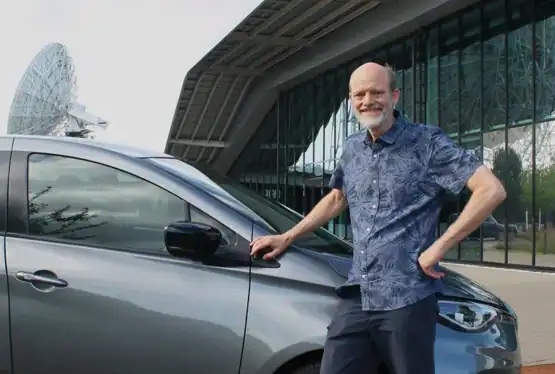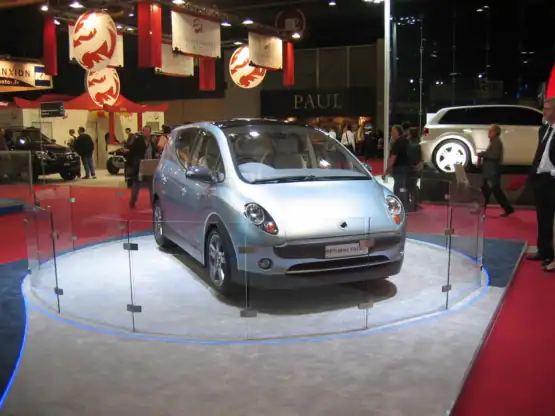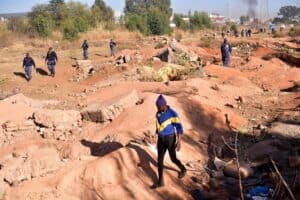Joule EV project founder believes SA still has the capability – but isn’t sure whether it should try because of the dominance of Chinese automakers in this market.

South Africa missed an opportunity to get ahead in the global electric vehicle (EV) race when the technology was in its infancy. The government pulled the plug and stopped financing the Joule EV project.
Gerhard Swart, one of the four founders and initial shareholders of Optimal Energy, developers of the Joule, said the 2008 global financial crisis scuppered advanced plans to obtain funding from a consortium of French banks.
The Industrial Development Corporation (IDC), which had been partly funding the project, subsequently stopped the company from obtaining foreign funding, he said.
Optimal Energy shut down in 2012.
Swart said it went through three stages of prototypes for the Joule, with a full-scale model of the car made in the first stage. The company was publicised for the first time at the 2008 Paris Auto Show, where the Joule was on display to test the reaction of the public and the industry to what they had developed.
“We had also set up a meeting with a consortium of French banks that were interested in investing in us at the same time but when we met with them they said: ‘Two weeks ago we had cash, today we have nothing.’ That was the big financial crash in 2008,” he said.
ALSO READ: Eskom launches exciting electric vehicle infrastructure, but you can’t use it!
Swart was speaking at a launch of the book he wrote about the Joule – Hope Arising: The story of South Africa’s Joule electric vehicle, and why it still matters – at the head office of Automotive Investment Holdings (AIH) last week.

AIH, particularly CEO Corrie Kotzé and director Johan Cloete, were involved in the Joule project from the outset and developed the company’s business plan.
“We needed credibility because we had never done this before, and AIH [was] our umbilical cord, in a certain way, into the automotive industry. We got a lot of good advice and a lot of good introductions from them,” said Swart.
Among other projects, AIH Logistics is Mahindra’s Pik Up’s local assembly partner in the Dube TradePort Special Economic Zone in KwaZulu-Natal.
Swart said it had always been Optimal Energy’s plan to get an injection of funding from a significant foreign shareholder, who would buy out the South African government’s shareholding.
ALSO READ: SA is experiencing slow transition to electric vehicles, says expert
The government took shareholding in Optimal Energy when the Department of Science and Technology’s Innovation Fund provided funding to the company for the project.
Swart said everybody was excited when they returned from the Paris Auto Show and many distributors approached them about the distribution rights once the car was finished.

He said the IDC and the Technology Innovation Agency wanted them to scale up and make 50 000 units a year to get the Joule into the market as quickly as possible.
Swart said that meant a lot more funding than Optimal Energy had in mind at that stage, resulting in it appointing PwC and two other companies as transaction advisors.
“They did a due diligence on us and said they believed they could get us funding within one year.
“That was great up to that point. But then somebody in the IDC said: ‘Oh, these guys [PwC] want a retainer and we are not willing to let you use our money to pay a retainer for these guys to bring you other money’.
“Unlike Elon Musk, none of us as shareholders had any money, so there was no other option,” he added.
Swart said the IDC said Optimal could not get foreign funding but that the IDC would fund it.
ALSO READ: SA rolls out tax incentives to boost electric vehicle manufacturing by 2026
He said the Pebble Bed Modular Reactor (PBMR) project was cancelled when Jacob Zuma became president because he had other priorities, and the support Optimal Energy received from the government started declining.
“Although the officials said ‘yes, yes’, they never said yes with some cheques,” he said.
“We carried on but spent less and less and then we eventually had to stop because the government did not put the money on the table, and the IDC refused to carry on funding the project.”
Swart believes South Africa still has the capability to develop an EV but is uncertain whether it should because China has become so good at developing EVs that they are even a challenge for the automotive industry in Europe.
“For a start-up to now break into that is hard unless you come up with something that is a different paradigm. The move from internal combustion to electric is a structural jump. You didn’t quite see the puzzle fitting together.
“If there are things like that that give us a real competitive advantage as a country, then I would say ‘Yes, go for it’. But I’m not sure for passenger cars. There may be other opportunities.”
ALSO READ: Is South Africa ready for electric vehicles?
A lesson for government
Swart, who has been living in the UK for the past eight years, believes the African market has a lot of untapped potential and is an “up and coming” continent, but questions whether South Africans see that potential and go to the trouble of understanding what would make South Africa products work in Africa.
“We have a huge market if we have the right product,” he said.
“There is so much creativity and pioneering spirit. Here we think we can do things. In the UK, they seem to find every reason why not to do things. I really believe there is capacity for any such big projects,” he said.
Swart said one of the lessons learnt from the Joule project is for government to ensure that the funding gap is addressed.
After Optimal Energy, Swart was involved in a battery development for renewable energy systems but ran into exactly the same problem.
“We needed R6 million, a tiny amount, and we would have had our own battery energy storage systems like the Tesla Powerwall.
“So addressing that and not interfering and not becoming too involved in business is a lesson for government.
“They should fund but keep [their] hands off,” he said.
ALSO READ: Cars can help SA be greener but government needs to come to the party
Swart said the four Optimal Energy founders – Kobus Meiring, Mike Lomberg, Jian Swiegers and himself – each had a 25% shareholding when they started, but by the time they closed the company, it was down to 2.5% “and the company had not yet even sold a car yet”.
“You are hoping that your stake is in a bigger thing that is getting more and more valuable but there was still so much risk.
“It was still essential for us as founders to carry the vision because the government nor the IDC carried the vision,” he said.
This article was republished from Moneyweb. Read the original here.






